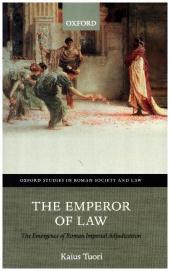 Neuerscheinungen 2016Stand: 2020-02-01 |
Schnellsuche
ISBN/Stichwort/Autor
|
Herderstraße 10
10625 Berlin
Tel.: 030 315 714 16
Fax 030 315 714 14
info@buchspektrum.de |

Kaius Tuori
The Emperor of Law
The Emergence of Roman Imperial Adjudication
2016. 496 S. 6 ill. 222 mm
Verlag/Jahr: OXFORD UNIVERSITY PRESS 2016
ISBN: 0-19-874445-5 (0198744455)
Neue ISBN: 978-0-19-874445-0 (9780198744450)
Preis und Lieferzeit: Bitte klicken
The Emperor of Law explores how the Roman emperor came to assume the mantle of supreme legal authority in the Empire. It offers a fundamental reinterpretation of the advent of imperial supremacy in law based on an analysis of the gradual expansion and elaboration of the emperor´s adjudication and jurisdiction through historical narratives.
In the days of the Roman Empire, the emperor was considered not only the ruler of the state, but also its supreme legal authority, fulfilling the multiple roles of supreme court, legislator, and administrator. The Emperor of Law explores how the emperor came to assume the mantle of a judge, beginning with Augustus, the first emperor, and spanning the years leading up to Caracalla and the Severan dynasty. While earlier studies have attempted to explain this change either through legislation or behaviour, this volume undertakes a novel analysis of the gradual expansion and elaboration of the emperor´s adjudication and jurisdiction: by analysing the process through historical narratives, it argues that the emergence of imperial adjudication was a discourse that involved not only the emperors, but also petitioners who sought their rulings, lawyers who aided them, the senatorial elite, and the Romanhistorians and commentators who described it. Stories of emperors settling lawsuits and demonstrating their power through law, including those depicting ´mad´ emperors engaging in violent repressions, played an important part in creating a shared conviction that the emperor was indeed the supremejudge alongside the empirical shift in the legal and political dynamic. Imperial adjudication reflected equally the growth of imperial power during the Principate and the centrality of the emperor in public life, and constitutional legitimation was thus created through the examples of previous actions - examples that historical authors did much to shape. Aimed at readers of classics, Roman law, and ancient history, The Emperor of Law offers a fundamental reinterpretation of the muchdebated problem of the advent of imperial supremacy in law that illuminates the importance of narrative studies to the field of legal history.
The author has indeed produced a work of judgment and sense, one that all students of the imperial legal system will find helpful. B.M. Levick, American Historical Review
Kaius Tuori is currently an Academy of Finland Research Fellow. He studied at the Universities of Helsinki, Finland, and La Sapienza in Rome, and holds a doctorate in Law and an M.A. in History. His research interests include legal history, Roman law, legal anthropology, classical archaeology, and their intellectual history, and his publications include two academic monographs and several articles in journals such as Law, Culture and the Humanities, The
Journal of Legal History, the Journal of Legal Pluralism, Revue internationale des droits de l´Antiquite, and the Legal History Review. He is also a co-editor of the forthcoming Oxford Handbook of Roman Law and Society alongside Paul J. du Plessis and Clifford Ando.


